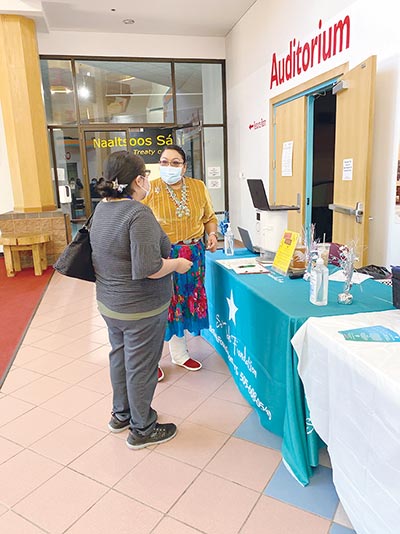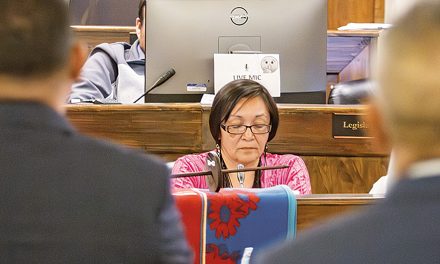
So’ Tsoh Foundation partners with Arizona caregiving organization
TEMPE, Ariz.
Caregivers protect and advocate for our elders, but who does that for our caregivers?
The So’ Tsoh Foundation, a Navajo non-profit organization specializing in caregiver resources, partnered with Duet Partners in Aging and Health, an institute that provides services to “home-bound” individuals and caregivers, to share a film and discussion on remaining strong as a caregiver.

Submitted
So’ Tsoh Foundation founder Valerie Tsosie, gold shirt, speaks to an individual about her organization at the Navajo Nation Museum in Window Rock.
“The way we look at serving communities is by partnering with people in communities where they’re already there. We’re not trying to go in and recreate everything that they’re doing but take a program we know that has been successful for helping family caregivers and regain hope, build resiliency on their caregiving journey, like So’ Tsoh Foundation,” said Justin McBride, Duet’s program manager.
Duet collaborated with So’ Tsoh to bring the reservation a 10-week video series, “Finding Meaning and Hope,” as a resource to support Caregivers in a main message both McBride and Valerie Tsosie, So’ Tsoh Foundation founder, had in common.
Not alone
The film “Finding Meaning and Hope” is based on Dr. Pauline Boss’s book, “Loving Someone who has Dementia.”
McBride said, “The program focuses on different concepts of the book that help caregivers gain resiliency and find hope on their journey.”
Unfortunately, the services provided by the tribe had its people “jump through hoops” and ultimately made those seeking help feel alone.
Tsosie said, “There’s a lot of services for our elders, like the senior center, they get food, they get discounts and stuff like that, but what about our caregivers that are driving them around to get their food, to drive them to the senior center and then they’re being treated not that great.”
While discussing the contrasts between reservation and off-reservation life, Tsosie pointed out an outdated technology system through reservation government programs.
“My own experience coming back to the reservation was nothing works. On the website, the phone number doesn’t work. The address? They moved ten times already, but nothing worked, it was really annoying, and then I thought, well, I can do it; I can do better. I mean common, these are businesses, the people need help,” Tsosie said.
Tsosie not only noticed an outdated technology system but, to her, a poor willingness to assist either elders or caregivers from the people who work in government offices.
“Even if I give you the phone number and the name, it’s frustrating because when you’re dealing with the tribe, the attitude is not that great, customer service is not that great, so they get even more frustrated, and you’re like what do I do?” Tsosie asked.
When one decides to reach out, and they’re met with discontinued phone numbers, wrong building locations, and even an unjoyful attitude, it creates an obstacle to stop moving forward for help.
“One thing I always ask my caregivers is, who is going to take over if they’re not there? Especially here on the reservation, so we need to make sure our caregivers are doing well because where are they going to go? Who’s going to take care of them?” Tsosie asked.
Not only was reaching out on behalf of themselves hard but so was reaching out for an elder who only speaks Navajo.
Tsosie said, “For our caregivers, a lot of times, they have to go off the reservation to get these services, and they might as well be foreign because a lot of the caregivers are dealing with the elders who prefer Navajo, and their understanding can be a barrier, and I feel like that is such a disservice because there is some really good information out there.”
Adding the stress of reaching out for themself and others, the action of taking care of someone was an even more significant stress.
Tsosie said that after training, caregivers would continue asking questions that Tsosie was unsure of.
“My person is exhibiting this behavior, they’re like this, they’re doing this, it’s freaking me out, I’m scared, or I’m really starting to wonder, what is this, is it dementia, is it Alzheimer’s (disease)?” she said.
Despite the tough questions and the obstacles that popped up left and right, Tsosie said she was going with the community’s needs.
From that moment onward, Tsosie took the many hardships caregivers faced, and she sought resources for them to utilize.
A huge misconception about caregiving, pointed out by Tsosie, is there’s not much to it. But there’s more to it than just physically being there to help someone who needs care.
“You have the emotional part of it; if it’s a child taking care of their parent, the roles are switched, seeing your parent deteriorate, going down, not being that figure you’ve seen is very emotional and has a lot these different factors that go into it,” Tsosie said.
When Tsosie heard about Duet’s video series and discussion, she knew it was something that the community needed.
Tsosie said, “When I found out about Duet doing a 10-week discussion program, it was like ‘Woah’ because I got caregivers that are in IT now. They’ve gone over that emotional hump; they’re really in it now. This 10-week program is for them.”
The video series and discussion opened the community caregivers’ eyes, allowing them to socialize on a topic they all have felt alone in.
“Being a caregiver, you get so isolated, you think you’re the only person dealing with this, you’re run down and tired because you might be the only person taking care of that person who needs care,” said Tsosie, also sharing that there’s a loss of hope for many.
Sha’nah
Tsosie shared that they had an inspiring word at the beginning of the week. Last week’s word was “Sha’nah,” meaning getting hope back.
“You’re going to know that you’re not the only one and that there are resources,” she said. “That’s what I’m working on, getting those resources to the people and that it’s culturally relevant, it won’t matter if they can’t understand it – It’s also that they get that hope back, they feel that weight off their back – It’s nice that they get to see others going through it and that they’re not alone.”
The 10-week-long video series and discussion will be available through call-in or zoom. On the first day of the program, Feb. 14, the So’ Tsoh Foundation provided an in-person experience at the Navajo Nation Museum. However, with recent weather conditions on the reservation, not many people made it in.
But that didn’t stop the conversation, nor the few people who did show up. Tsosie shared that one family had traveled over an hour to attend the event.
“Regardless of the snow, they came out, and it reminded me why this is needed,” Tsosie said.








 Highway 264,
Highway 264, I-40, WB @ Winslow
I-40, WB @ Winslow